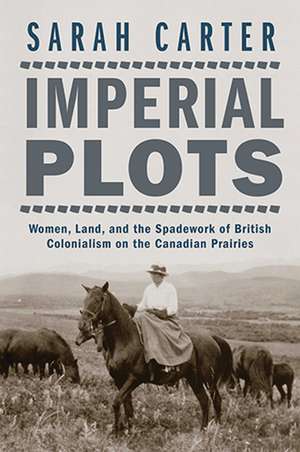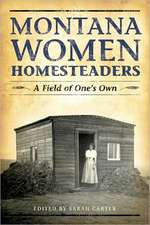Imperial Plots: Women, Land, and the Spadework of British Colonialism on the Canadian Prairies
Autor Sarah Carteren Paperback – 17 oct 2016
Sarah Carter’s Imperial Plots: Women, Land, and the Spadework of British Colonialism on the Canadian Prairies examines the goals, aspirations, and challenges met by women who sought land of their own.
Supporters of British women homesteaders argued they would contribute to the “spade-work” of the Empire through their imperial plots, replacing foreign settlers and relieving Britain of its surplus women. Yet far into the twentieth century there was persistent opposition to the idea that women could or should farm: British women were to be exemplars of an idealized white femininity, not toiling in the fields. In Canada, heated debates about women farmers touched on issues of ethnicity, race, gender, class, and nation.
Despite legal and cultural obstacles and discrimination, British women did acquire land as homesteaders, farmers, ranchers, and speculators on the Canadian prairies. They participated in the project of dispossessing Indigenous people. Their complicity was, however, ambiguous and restricted because they were excluded from the power and privileges of their male counterparts.
Imperial Plots depicts the female farmers and ranchers of the prairies, from the Indigenous women agriculturalists of the Plains, to the land army women of the First World War.
Supporters of British women homesteaders argued they would contribute to the “spade-work” of the Empire through their imperial plots, replacing foreign settlers and relieving Britain of its surplus women. Yet far into the twentieth century there was persistent opposition to the idea that women could or should farm: British women were to be exemplars of an idealized white femininity, not toiling in the fields. In Canada, heated debates about women farmers touched on issues of ethnicity, race, gender, class, and nation.
Despite legal and cultural obstacles and discrimination, British women did acquire land as homesteaders, farmers, ranchers, and speculators on the Canadian prairies. They participated in the project of dispossessing Indigenous people. Their complicity was, however, ambiguous and restricted because they were excluded from the power and privileges of their male counterparts.
Imperial Plots depicts the female farmers and ranchers of the prairies, from the Indigenous women agriculturalists of the Plains, to the land army women of the First World War.
| Toate formatele și edițiile | Preț | Express |
|---|---|---|
| Paperback (1) | 218.64 lei 3-5 săpt. | |
| University of Manitoba Press – 17 oct 2016 | 218.64 lei 3-5 săpt. | |
| Hardback (1) | 505.71 lei 6-8 săpt. | |
| University of Manitoba Press – 7 oct 2016 | 505.71 lei 6-8 săpt. |
Preț: 218.64 lei
Nou
Puncte Express: 328
Preț estimativ în valută:
41.84€ • 43.35$ • 34.92£
41.84€ • 43.35$ • 34.92£
Carte disponibilă
Livrare economică 01-15 martie
Preluare comenzi: 021 569.72.76
Specificații
ISBN-13: 9780887558184
ISBN-10: 0887558186
Pagini: 480
Ilustrații: 7
Dimensiuni: 156 x 235 x 33 mm
Greutate: 0.86 kg
Ediția:1
Editura: University of Manitoba Press
Colecția University of Manitoba Press
ISBN-10: 0887558186
Pagini: 480
Ilustrații: 7
Dimensiuni: 156 x 235 x 33 mm
Greutate: 0.86 kg
Ediția:1
Editura: University of Manitoba Press
Colecția University of Manitoba Press
Notă biografică
Sarah Carter FRSC is professor and Henry Marshall Tory Chair in the Department of History and Classics and the Faculty of Native Studies at the University of Alberta.
Descriere
Sarah Carter’s Imperial Plots explores the strategies women drew on to obtain and cultivate land of their own. Heated debates about women farmers touched on issues of ethnicity, race, gender, class, and nation, but despite legal and cultural obstacles, British women acquired land in Canada as homesteaders, farmers, ranchers, and speculators. Imperial Plots depicts the female farmers and ranchers of the prairies, from the Indigenous women agriculturalists of the Plains to the land army women of the First World War.

